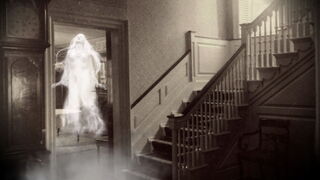Magical Thinking
Why Women Are More Likely to Believe in the Supernatural
Key differences in empathy and intuition.
Posted March 23, 2022 Reviewed by Gary Drevitch
Key points
- Widespread belief in the paranormal persists among people today, but are generally more likely to be present in women.
- Ontological confusion (i.e., blurring the distinction between animate and inanimate objects) is a strong predictor of paranormal belief.
- Women score higher on measures of empathy, which has also been associated with greater paranormal beliefs.

Despite the increased availability of scientific knowledge, acceptance of scientifically unsupported beliefs such as in the existence of supernatural or paranormal phenomena remains widespread. One widely replicated finding is that women are more likely than men to believe in a wide range of such phenomena, such as astrology, ghosts, psychic powers, and more. It has been argued that this is due to women’s greater preference for intuitive thinking styles compared to men (Ward & King, 2020). Although paranormal beliefs are related to intuitive thinking, though, gender differences in such beliefs remain strong even when accounting for this factor (Lindeman & Aarnio, 2006). Hence, the reasons for the large and persistent disparity between men and women in supernatural or paranormal beliefs is yet to be fully explained.
As a recent example, a nationally representative American survey asked over 1000 people about their views on various scientifically unsupported phenomena, including belief in supernatural human abilities — specifically, foretelling the future and telekinesis — hauntings, advanced ancient civilizations such as Atlantis, mysterious life forms like Bigfoot, whether extra-terrestrials had visited the earth, and whether they were afraid of ghosts and zombies (yes, really!)[1] (Silva & Woody, 2022). On average, women scored significantly higher than men in beliefs about supernatural human abilities, hauntings, and Atlantis, and were more likely to fear ghosts and zombies. There were no significant differences between men and women in belief in extra-terrestrial visitation or Bigfoot.
These results are largely in line with previous findings, although some research found that men were more inclined than women to believe in extra-terrestrial visitors (Aarnio & Lindeman, 2005; Rice, 2003). The authors (Silva & Woody, 2022) noted that gender differences mainly concerned phenomena related to spiritual or nonmaterial forces rather than concrete material entities like Bigfoot or extra-terrestrials.
They suggested that women may be more interested in supernatural explanations of the world that cannot be scientifically validated, whereas men may be more interested in phenomena that can be scientifically confirmed with proper evidence, although admittedly gender differences in the latter were not significant.
Based on this reasoning, they noted that it was less clear why women would be more likely to believe in advanced ancient civilizations like Atlantis than men and suggested that this item may be open to a spiritual rather than purely material interpretation. Specifically, modern New Age and occult belief systems often attribute great spiritual importance to Atlantis, regarding Atlanteans as possessing profound esoteric knowledge that has been lost to modern peoples.
As to why women are more likely than men to believe in spiritual or paranormal phenomena, Silva and Woody suggest a sociological explanation based on gendered social expectations, e.g., that “most configurations of American masculinity are characterized by notions of rationality” and that men are “socially rewarded for displaying traits such as detached rationality” while femininity “is often associated with the emotional and spiritual realms.”
However, whether men are actually socially rewarded for disbelief in supernatural phenomena compared to women is debatable. Outside the U.S., similar sex differences in paranormal beliefs have been found, in Canada, the United Kingdom, Finland, and Austria (Aarnio & Lindeman, 2005; Ward & King, 2020). Nevertheless, there is not a wide enough selection of countries to make a comprehensive cross-cultural comparison that would allow a test of how societal differences in gender norms about rationality are related to paranormal beliefs.
Several studies have found that paranormal and supernatural beliefs are related to greater preference for intuitive thinking and less preference for analytical thinking (Aarnio & Lindeman, 2005; Pennycook et al., 2012). However, even when accounting for such differences in thinking styles, substantial differences remain between women and men in such beliefs. For example, a number of studies have used the cognitive reflection test to examine gender differences.
In this test, respondents are presented with a series of problems that each have an intuitively appealing answer that happens to be incorrect. Therefore, to answer correctly, one must reject one’s initial intuitive response and rely on more reflective processing. Several studies show that men score more correct answers on the test than women on average, and that lower scores are related to greater paranormal belief (Pennycook et al., 2012).
However, one study found that cognitive reflection test scores no longer significantly predicted paranormal beliefs when accounting for a large number of other relevant factors (Betsch et al., 2020). Specifically, the strongest predictor of paranormal belief in the study was ontological confusion (i.e., blurring the distinctions between phenomena that belong to different ontological categories, such as mental vs. physical, and animate vs. inanimate), followed by female sex, and then by several other factors, including personality traits of high openness to experience and low conscientiousness, poor understanding of causality, and higher death anxiety. Hence, intuitive and analytical thinking styles seem to be less important in explaining paranormal belief than other factors.
Ontological confusion seems particularly relevant as it includes such things as believing that thoughts can have physical properties or that inanimate objects can have feelings and memories, which can lead one to view the world in a way that makes supernatural beliefs seem plausible. Still, ontological confusion alone is not enough to explain why women are more likely to believe in the paranormal than are men.
Another cognitive difference between women and men that may be relevant relates to propensity for empathising (i.e. interest in and ability to understand others’ mental states) and systematising (i.e., interest in and ability to understand inanimate physical systems).
Research has found that women tend to be higher on empathising and lower on systematising than are men. Additionally, a study (Lindeman et al., 2015) found that the combination of high empathising and low systematising was associated with greater paranormal beliefs, even when accounting for the effects of ontological confusion, which also significantly predicted such beliefs. Hence, sex differences in the paranormal may reflect women’s greater interest in the minds of others than in lifeless physical systems.
Unfortunately, this study did not report whether the combination of high empathising/low systematising, along with ontological confusion, was enough to completely account for differences between women and men in paranormal beliefs. It could well be that the full explanation of why women are more likely than men to believe in the paranormal involves a complex combination of factors rather than any single variable, whether sociological or psychological.
[1] The survey found that over 22% of respondents reported fearing ghosts, while over 15% feared zombies. Stories about ghosts have been part of western folklore since time immemorial, so that some people believe in them seems expected, but I was surprised that belief in zombies was at all common in the USA as I did not think this was a common part of western folklore outside of pop culture. Maybe some people watch too many horror movies? Where such a belief arises from would be an interesting topic for further study.
Facebook image: Kzenon/Shutterstock
References
References
Aarnio, K., & Lindeman, M. (2005). Paranormal beliefs, education, and thinking styles. Personality and Individual Differences, 39(7), 1227–1236. https://doi.org/10.1016/j.paid.2005.04.009
Betsch, T., Aßmann, L., & Glöckner, A. (2020). Paranormal beliefs and individual differences: Story seeking without reasoned review. Heliyon, 6(6), e04259. https://doi.org/10.1016/j.heliyon.2020.e04259
Lindeman, M., & Aarnio, K. (2006). Paranormal beliefs: Their dimensionality and correlates. European Journal of Personality, 20(7), 585–602. https://doi.org/10.1002/per.608
Lindeman, M., Svedholm-Häkkinen, A. M., & Lipsanen, J. (2015). Ontological confusions but not mentalizing abilities predict religious belief, paranormal belief, and belief in supernatural purpose. Cognition, 134, 63–76. https://doi.org/10.1016/j.cognition.2014.09.008
Pennycook, G., Cheyne, J. A., Seli, P., Koehler, D. J., & Fugelsang, J. A. (2012). Analytic cognitive style predicts religious and paranormal belief. Cognition, 123(3), 335–346. https://doi.org/10.1016/j.cognition.2012.03.003
Rice, T. W. (2003). Believe It Or Not: Religious and Other Paranormal Beliefs in the United States. Journal for the Scientific Study of Religion, 42(1), 95–106. https://doi.org/10.1111/1468-5906.00163
Silva, T., & Woody, A. (2022). Supernatural Sociology: Americans’ Beliefs by Race/Ethnicity, Gender, and Education. Socius, 8, 23780231221084776. https://doi.org/10.1177/23780231221084775
Ward, S. J., & King, L. A. (2020). Examining the roles of intuition and gender in magical beliefs. Journal of Research in Personality, 86, 103956. https://doi.org/10.1016/j.jrp.2020.103956




